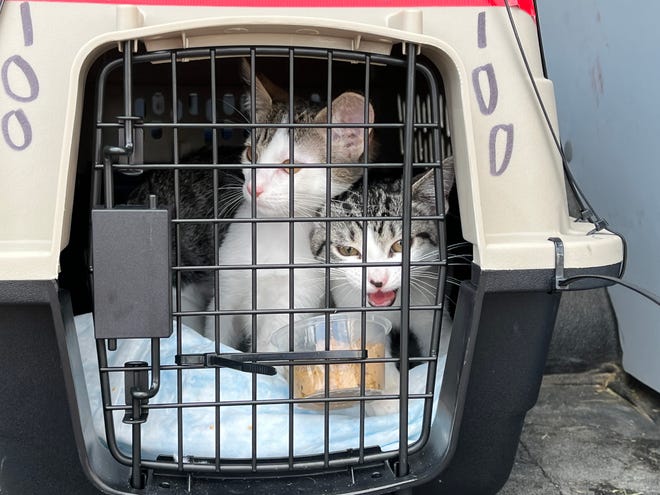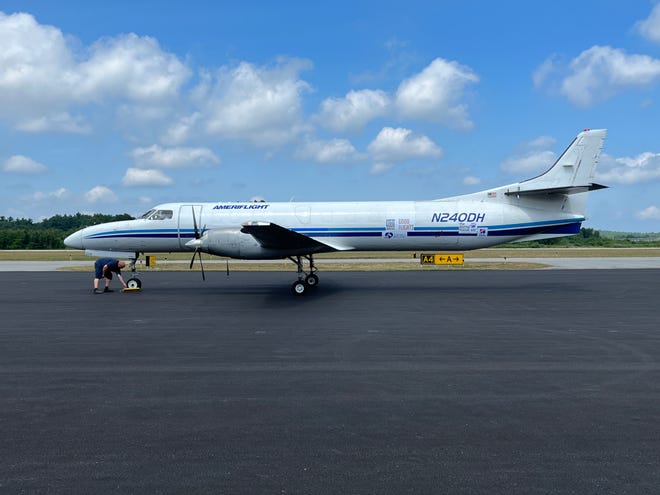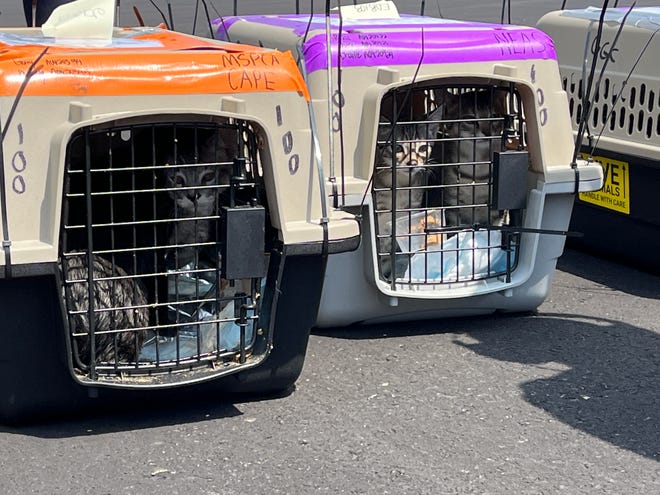150 kittens and cats took an airline flight from Florida to New Bedford. Here's why.
NEW BEDFORD — If you think there are a lot of stray and "outside" cats in your SouthCoast neighborhood, Mike Keiley, director of adoption centers and programs for MSPCA Angell, says you should see Florida, where tourist season doubles as peak cat breeding season.
"The warm climate there means optimal breeding seasons for outdoor cats, so Florida's cat population is much higher than Massachusetts," Keiley said. "And one of the best things about Massachusetts is that it's one of the states with the highest cat ownership."
That's why on Wednesday, MSPCA flew in roughly 150 cats and kittens from the Sunshine State to New Bedford Regional Airport via jet funded by Greater Good Charities' Good Flights program to be adopted out through several shelters that have the space to accommodate them. The landing signified the start of the "Southern Hub" project, which MSPCA looks to spin into an ongoing effort to help relieve the strain caused by Florida's overpopulation of cats.

"We’d been working continuously to build out an entire flight, and it came down to literally last night when we finalized the roster," Keiley said on Wednesday shortly after the cats' Whaling City arrival around 11:30 a.m. "The flight was at 6 a.m. It's very hot in Florida so we wanted to make sure these animals weren't exposed to too much heat."
After landing, the cats were transported to several ASPCA shelters and affiliates — including locations in Cape Cod,Salem, Boston and Methuen — where they would undergo a 48-hour isolation period as per Massachusetts state regulation, as well as veterinary check-ups before they could be considered adoptable in time for a weekend adoption event at all said locations.

COVID inflated, then deflated, pet adoption
But while Florida's climate makes the state especially susceptible to cat overpopulation, there's yet another factor impacting animal welfare nationwide, Keiley said.
"We're doing this during a really difficult time in animal welfare, where, over the last couple of years of the COVID pandemic, we saw an incredible lift in adoption which has been hugely helpful during a really unstable time in our nation. However now we're finding the same number of animals are coming into shelter, but the adoption interest has dropped," Keiley said. "According to Shelter Animals Count, which is a trusted database that tracks data surrounding animal sheltering, there's a 6% Surplus of dogs and cats throughout the country and animals coming in at the same pace as 2019, but they're not getting adopted at the same rate as they were even last year."

Implications of cat overpopulation
According to the U.S. Humane Society, "Predation by outdoor cats on birds and other wildlife is a real and legitimate concern. While The HSUS believes that outdoor cats are entitled to protection, it also believes that wildlife populations need to be protected from cats." In addition, Keiley says there are nuisance issues to consider. "I think, in a broad statement, anytime there’s an overpopulation of outdoor cats, there’s an impact on complaints from neighbors if they’re spraying or fighting, and it’s in everybody’s best interest to deal with the overpopulation issue with cats and other animals," he said.

Lessons from Katrina
While relocation of animals as a means to mitigate those impacts is not a new concept, Keiley says Wednesday's efforts were reflective of a stepped-up approach first "mainstreamed" within the animal welfare field as result of Hurricane Katrina in 2005, when thousands of animals throughout Louisiana and the Gulf Coast were suddenly displaced. The benefit of this approach is multifold, Keiley said.
"It’s very common to relocate animals from one shelter to another for adoption, but I think what you’re seeing is one more step beyond that here, where the Florida shelters that the cats are coming from are refilling those cages with cats from other shelters around them that just don’t have the same level of resources or are really overburdened with the number of cats coming in," Keiley said. "They’re getting that relief more directly in a way that’s more achievable for them than it would be it they were trying to get them to Massachusetts on their own."

Keeping it going
Keiley says Wednesday's flight was hopefully only the first of many more to come. "The hope is to continue doing this on a regular basis because the need is really continuous in Florida," he said. "Maybe in the winter the need isn't as great, but by the time we get to June, July and August, the number of cats coming into shelters throughout Florida outpaces the ability to rehome them.
"We know that Massachusetts residents love cats, and we need those adopters now more than ever."
In addition to permanent adoptive homes, Keiley also noted that there is also great demand for temporary animal foster homes and donations. To get involved, visit www.mcpca.org.


No comments:
Post a Comment
Note: Only a member of this blog may post a comment.